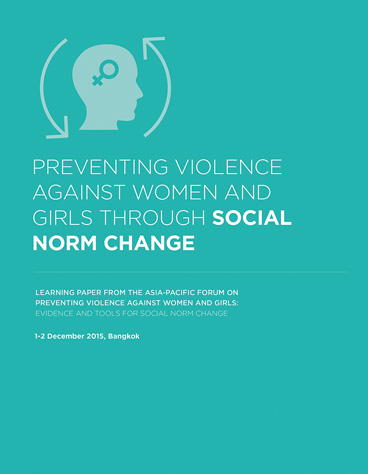
Preventing violence against women and girls through SOCIAL NORM CHANGE

Given the developments in the Asia-Pacific region and beyond since the global Expert Group Meeting on VAWG prevention that took place in 2012, UN Women and UNFPA, in partnership with the Austral-ian Government and KWDI, hosted an Asia-Pacific Forum on Preventing Violence against Women and Girls: Evidence and Tools for Social Norm Change, for senior experts, policymakers, practitioners and development partners on 1-2 December 2015 in Bangkok, Thailand. The primary aim was to reflect on how social norms change can be affected, share concrete evidence and good practices in the area of prevention, present practical and evaluated tools to promote and implement preventive actions, and explore ways forward.

For most girls in the Asia-Pacific, gender inequality starts early in life, with limited access to education in many countries, and socio-cultural norms that underpin son preference, child marriage, and various forms of gender-based violence. Nearly half of child marriages globally occur in South Asia, and among those around 1 in 4 are married before the age of 15, thereby limiting girls’ future opportunities. Unequal social norms assign strict gender roles based on stereotypes of men as providers and women as care givers, prizing physical strength, aggression [..] Research has shown that across the Asia-Pacific re-gion, rates of VAWG vary by country. A ground-break-ing study on men’s use of violence in the Asia-Pacific, led by the UN joint programme, Partners for Preven-tion (P4P), found that overall nearly one in two men reported using physical or sexual violence against a female partner, ranging from 26 per cent to 80 per cent across sites. Nearly a quarter of the men interviewed re-ported raping a woman or girl, and half of these men reported that they committed rape for the first time when they were under the age of 18.